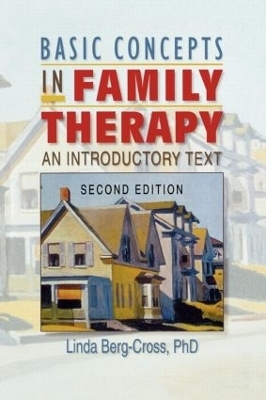
Basic Concepts in Family Therapy
Routledge (Verlag)
978-0-7890-0941-8 (ISBN)
the importance of spirituality and religion in family therapy
generational boundaries, closeness, and role behaviors
managing a family's emotions
defining problems and generating and evaluating possible solutions
teaching children specific attitudes, values, social skills, and norms
transracial adoptions and normative processes and developmental issues of adoptive parents
strategies for reducing conflict
. . . and much more!Basic Concepts in Family Therapy will help to broaden your understanding of the ways families function in general. You can use the effective concepts explored in this text to make a thorough assessment of the impact of a disorder on a child and on the rest of his or her family, as well as how family dynamics might have shaped or exacerbated the problems. The concepts described in this text can be customized to clients’cultural values to avoid unnecessary resistance. As a new therapist, you will gain confidence in your assessments, and if you are already a seasoned professional, you will gain creativity in your interventions.
Linda Berg Cross
Contents
About the Author
Contributors
Preface
Acknowledgments
Introduction
Unit I: Getting Acquainted with The Family
Chapter 1. Exploring the Family Structure
What Is a Family?
The Family Life Cycles
Techniques for Focusing on the Family
Self-Exploration: Discovering Your Family Life Space
Self-Exploration: Using the Jack
Unit II: Family Concepts-A Systems Perspective
Chapter 2. Individuation
Parents' Socioemotional Investment in Children: Precursors to Successful Individuation and Separation
Theories of Individuation
Generational Boundaries, Closeness, and Role Behaviors
Individuation As a Lifelong Process
Self-Expoloration: Individuation
Chapter 3. Separation
Infancy and Early Childhood
Middle Childhood and Early Adolescence
Late Adolescence and Leaving Home
Divorce and Joint Custody
Parental Death and a Child's Grief
Self-Exploration: Separations
Chapter 4. Cutoffs
The Concept of Cutting Off
The Painful Process of Cutting Off
Reconstructing the Relationship
Developmental Timing
When Are Cutoffs Beneficial?
Self-Exploration: Family Cutoffs
Chapter 5. Triangles
Vulnerability and Self-Protection
The Universal Triangle: Father/Mother/Child
Dysfunctional Triangles
Triangles and Family Types
Recent Research on Triangular Effects
Self-Exploration: Family Triangles
Chapter 6. Rituals
Types of Rituals
Positive Aspects of the Ritual
How Family Rituals Evolve and Develop
Altering Rituals and Establishing New Ones
Rituals and the Family Life Cycle
Self-Exploration: Family Rituals
Chapter 7. Secrets
Kinds of Family Secrets
Adaptive versus Maladaptive Secrets
Self-Exploration: Family Secrets
Chapter 8. Multigenerational Effects
Patterns of Multigenerational Transmission
The Family Legacy
Family Myths
Appreciating One's Multigenerational Heritage
Self-Exploration: Multigenerational Effects
Chapter 9. Networks and Ecosystems
Networks and In-Laws
Networks and Childhood Resiliency
Zones of Intimacy
The Importance of Networks
Networks and Elderly People
Networks and Black Americans
Using--and Not Using--Networks
Self-Exploration: Networking
Unit III: Family Concepts-Ecological Stressors
Chapter 10. Family Resiliency and Poverty
Poverty-Associated Risks
The Resilience Model
Multifamily Groups
Professional Consultation and Training
Self-Exploration: Family Resiliency and Poverty
Chapter 11. Chronic Illness in Children: Stressors and Family Coping Strategies
Prevalence and Nature of Psychological Disorders
The Bad News About Prevalence
The Good News About Prevalence
A Family Systems Framework for Understanding Chronic Illness
Illness Demands
Family System Resources and Family System Dynamics
Clinical Assessment of Family Meanings: The Meaning of Illness Evolves
A Treatment Model for Medical Family Therapy: Strategies for Chronic Illness
A Medical Family Therapy Toolbox
Self-Exploration: Chronic Illness
Chapter 12. Adoption and Infertility
Types of Adoption
Normative Processes and Developmental Issues of Adoptive Families
Transracial Adoptions
Conclusion
Self-Exploration: Are We Ready to Adopt a Child?
Unit IV: Family Concepts-A Cognitive Perspective
Chapter 13. Communication Styles
Individual Communication Styles
Spousal Communication
Communicating Intimately
Parental Communication
The “Ka” Solution: New Terms for Stepfamilies and the New Times
Self-Exploration: Family Types
Self-Exploration: Parenting Style
Self-Exploration: Intimacy
Chapter 14. Problem Solving
Strategies for Reducing Conflict
Hostility and In
| Erscheint lt. Verlag | 14.2.2000 |
|---|---|
| Verlagsort | New York |
| Sprache | englisch |
| Maße | 152 x 229 mm |
| Gewicht | 907 g |
| Themenwelt | Geisteswissenschaften ► Psychologie |
| Medizin / Pharmazie ► Medizinische Fachgebiete ► Psychiatrie / Psychotherapie | |
| Sozialwissenschaften ► Soziologie ► Mikrosoziologie | |
| ISBN-10 | 0-7890-0941-2 / 0789009412 |
| ISBN-13 | 978-0-7890-0941-8 / 9780789009418 |
| Zustand | Neuware |
| Haben Sie eine Frage zum Produkt? |
aus dem Bereich


